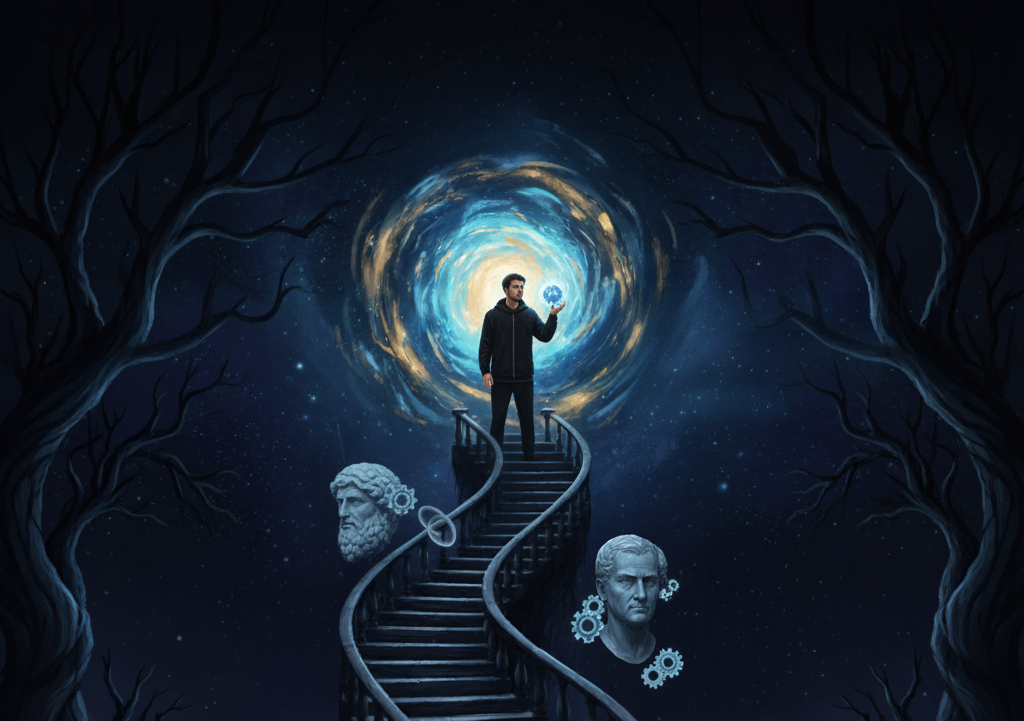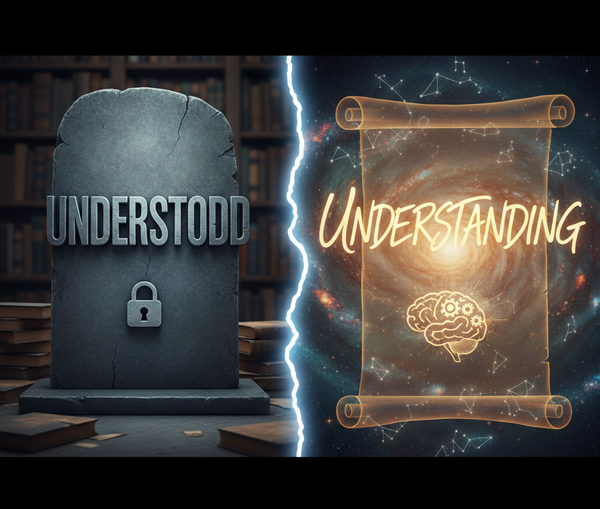The Esoteric Path to Comprehension: Why Geneosophy's Strange Assumptions Follow Philosophy's Greatest Tradition

When Plato proposed that reality consists of two worlds—one of changing appearances and another of eternal Forms—some of his contemporaries must have thought he'd lost his mind. When Kant suggested that objects conform to the structures of our minds rather than the reverse, the philosophical establishment was definitely surprised. Today, Geneosophy's notion of XI-potentiality interactions generating both concepts and objects might seem equally bizarre.
But this apparent strangeness isn't a bug—it's a feature. The most transformative philosophical breakthroughs in history have always appeared esoteric at first, precisely because they had to challenge assumptions so fundamental that everyone else treated them as obviously true.
The Universal Pattern of Philosophical Innovation
All philosophical traditions arise from wanting to solve a problem. They make new assumptions that seem esoteric compared to the common understanding of their time, then gradually get adopted by the community. This adoption eventually becomes so complete that we forget these were ever just assumptions—until new problems arise that the accepted framework cannot handle.
This pattern has repeated throughout intellectual history:
- Crisis: Existing assumptions lead to irreconcilable contradictions
- Esoteric Assumption: A thinker questions fundamental assumptions that everyone else takes for granted
- Initial Resistance: The new framework seems counterintuitive or mystical
- Gradual Adoption: The framework proves useful and spreads
- Unconscious Acceptance: The assumptions become invisible background conditions
- New Crisis: Problems emerge that the accepted framework cannot handle
The genius lies not in avoiding the "esoteric" label, but in understanding why revolutionary thinking must initially appear strange: it's questioning what everyone else considers unquestionable.
Plato: When Two Worlds Seemed Absurd
The Crisis: Greek philosophy was paralyzed by an impossible contradiction. Heraclitus insisted everything changes constantly—you can't step in the same river twice. Parmenides argued that true being is eternal and unchanging—what is, is; what is not, is not. If Heraclitus was right, knowledge was impossible because there was nothing stable to know. If Parmenides was right, the world of experience was illusory.
The Esoteric Assumption: Plato proposed something that seemed mystical: reality exists on two levels. The world of appearances is constantly changing, but behind it lies an eternal realm of perfect Forms. We gain knowledge not through the senses but through reason's access to these unchanging archetypes.
The Gradual Adoption: This "two-world" framework seemed counterintuitive, but it worked. It explained how we could have stable knowledge in a changing world. Over centuries, it became so fundamental to Western thought that we stopped noticing it was just one possible assumption. Christianity absorbed it (heaven/earth), science adopted it (mathematical laws/physical phenomena), and everyday language reflects it (we speak of "ideal" relationships, "perfect" circles).
Kant: When Mind Shaping Reality Seemed Impossible
The Crisis: By the 18th century, philosophy had split into irreconcilable camps. Empiricists like Hume argued all knowledge comes from experience, but this led to skepticism—we couldn't even justify belief in causation. Rationalists like Descartes claimed knowledge comes from reason, but couldn't connect abstract concepts to actual experience. Philosophy was deadlocked.
The Esoteric Assumption: Kant proposed his "Copernican Revolution"—instead of our minds conforming to objects, objects conform to the structures of our minds. We don't passively receive reality; we actively construct experience through a priori categories like causality and substance. This seemed to make the mind mysteriously powerful in shaping what we experience.
The Gradual Adoption: Initially absurd, this framework gradually became the foundation of modern thought. Science assumes mathematical structures describe nature, psychology studies how cognition shapes perception, and even common sense accepts that our mental frameworks influence experience. We've internalized Kant's "esoteric" insight so completely we rarely recognize it as revolutionary.
The Current Philosophical Crisis
Today we face our own seemingly irreconcilable split, centered on two of the deepest concepts: life and intelligence.
The Traditionalists (Materialists/Physicalists/Computationalists) believe there's no mystery that can't be solved with better algorithms and more computation. They point to genuine successes: AI systems solve complex problems, neuroscience maps brain functions, computers process information with increasing sophistication. Their approach delivers measurable results—it corresponds to a demonstrable truth.
The "Denialists" (Phenomenologists/Vitalists/Consciousness Theorists) insist something essential escapes computational capture. They point to the felt sense of understanding, the qualitative nature of experience, genuine creativity, the spark of life itself. They're right that concepts like life and authentic intelligence seem to involve more than algorithmic processing. But they struggle to articulate what this "more" actually is in rational terms.
Both sides have legitimate insights. The traditionalists solve real problems with their reductionist methods. The denialists correctly sense that life and intelligence involve something beyond current computational frameworks. Yet neither can fully account for what the other observes.
The Esoteric Nature of Geneosophy's Solution
This is precisely where Geneosophy enters as a synthesis, and why its core assumptions—XI (eXtended I) and potentiality—must initially seem strange.
Like Plato's Forms or Kant's a priori categories, XI and potentiality aren't traditional concepts that can be explained through other familiar concepts. They're presented as "non-concepts"—fundamental generative processes from which both subjective experience and objective reality co-arise. This seems bizarre precisely because we're embedded in frameworks that assume either:
- Mind represents an external world (traditional empiricism)
- Mind constructs experience from internal categories (Kantian idealism)
- Mind reduces to computational processes (modern materialism)
Geneosophy challenges all three by suggesting that what we call "mind" and what we call "world" are different expressions of the same underlying generative creativity.
Why This Synthesis Can Succeed
Geneosophy's apparent esotericism follows the same pattern that made Plato and Kant's breakthroughs possible:
Accommodating Both Sides: It doesn't dismiss either traditionalists or denialists but creates a broader conceptual space encompassing both perspectives. Computational processes are real expressions of generative dynamics, while the felt sense of consciousness and creativity reflects our participation in those same dynamics.
Resolving Core Problems: By grounding both intelligence and life in pre-conceptual generative processes, it provides a framework for comprehending genuine creativity—not just sophisticated recombination of existing patterns—while maintaining rational coherence.
Opening New Territories: Like previous syntheses, it doesn't just resolve contradictions but reveals entirely new territories for exploration that neither original position could have envisioned.
The Historical Vindication of the Esoteric
History shows that what seems most esoteric about breakthrough philosophies often becomes their most lasting contribution. Plato's "mystical" Forms evolved into the mathematical foundations of modern science. Kant's "impossible" mind-shaping-reality became the basis for understanding how cognitive frameworks structure all human knowledge.
If this pattern holds, Geneosophy's strange notion of XI-potentiality interactions generating both concepts and reality may seem less bizarre to future generations than it does to us. They may look back at our current debates about artificial intelligence and consciousness the way we now view medieval arguments about how many angels can dance on a head of a pin—as symptoms of conceptual frameworks that had reached their limits.
The Courage to Appear Esoteric
The deepest philosophical advances require intellectual courage: the willingness to propose assumptions that seem strange because they challenge what everyone else considers obviously true. This isn't mysticism or irrationality—it's the recognition that breakthrough understanding often requires stepping outside the conceptual boundaries that define normal discourse.
Geneosophy's apparent esotericism isn't a weakness but a sign that it's attempting something genuinely new: a framework that can account for both the computational successes of traditional approaches and the creative mysteries that those approaches cannot capture.
Whether this particular synthesis succeeds remains to be seen. But its initial strangeness places it squarely within philosophy's greatest tradition—the tradition of those bold enough to question the unquestionable and imagine new ways of understanding the fundamental nature of mind, reality, and the creative processes that give rise to both.
The esoteric path has always been the path to the most profound truths. What seems impossible today may be tomorrow's common sense.




